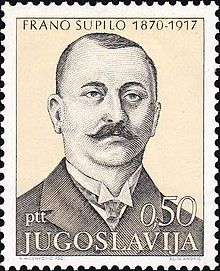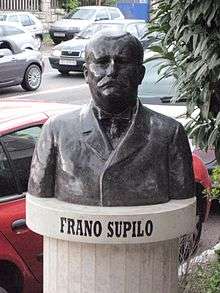Frano Supilo
| Frano Supilo | |
|---|---|
 | |
| Member of Parliament | |
|
In office May 1906 – October 1910 | |
| Personal details | |
| Born |
30 November 1870 Cavtat, Kingdom of Dalmatia (now Croatia) |
| Died |
25 September 1917 London, United Kingdom |
| Resting place | Dubrovnik City Hall, Croatia |
| Political party | Party of Rights |
| Other political affiliations | Croat-Serb Coalition |
| Occupation | Politician, Journalist |

Frano Supilo (30 November 1870 – 25 September 1917) was a Croatian politician and journalist.[1][2] He opposed the Austro-Hungarian domination of Europe prior to World War I.[3] He participated in the debates leading to the formation of Yugoslavia as a member of the Yugoslav Committee.[1] The author, R. A. Stradling, calls him "one of the most capable Croatian politicians ever."[4]
Early years
Supilo was born in Cavtat on 30 November 1870.[1][2][5][6]
He completed elementary education in Dubrovnik. He had to drop out of naval high school because of a lack of funds, and instead finished a two-year school of agriculture with Frano Gondola.[7] He traveled around Dalmatian vineyards educating wine-growers on peronospora.[8]
In 1890 he started work at Crvena Hrvatska ('Red Croatia') in Dubrovnik.[2][6] It was a social/political paper based on the ideas of the Croatian Party of Rights and fighting for the unification of Dalmatia with Croatia.
Supilo played the main role in changing the public opinion, which expressed itself in several elections that brought down the Autonomous Party (pro-Italian) and Serbian coalition that had gained power in the municipality of Dubrovnik in the 1880s with the support of the Habsburg court, which followed the policy of divide et impera. He became one of the leaders of the Croatian Party of Rights in 1895. After the party split, he campaigned against Josip Frank.
In 1900, he worked in Rijeka as the commissioner of the party's Dalmatian.
In 1900 he became the editor of Novi list in Rijeka.[6]
The Croato-Serb Coalition
Along with Ante Trumbić and Josip Smodlaka, he was one of the creators of both the Rijeka Resolution; and the Croat-Serb Coalition, both in 1905.[9][10]
Unitarisation
Ideologically, Supilo became the proponent of a "soft" Yugoslav unitarisation. He thought that Croats and Serbs (and later Slovenes) were a single people with three "tribes". This idea, which seems strange today, was shared by many of his contemporaries, based on the late national awakening of Croats, Serbs and Slovenes (not to mention Macedonians, Bosniaks and Montenegrins), the territorial closeness of Serbs and Croats, and the facts that the two peoples have very similar official languages. In practice, it meant the creation of a coalition that virtually recognized Serbs as a political entity in Croatia for the first time in its history.
An even stronger turn was the negotiation of the coalition and Supilo with the Hungarian and Italian politicians from Austria-Hungary. It was a very brave and innovative move, but a total flop. Supilo played on the temporary conflict between the Vienna court and the Italian irredentists and Hungarian imperialists, the traditional Croatian opponents who claimed their rights to some Croatian lands. He wanted to turn them into Croatian allies in the fight for the general democratization of the monarchy, which he believed would profit all peoples. But he estimated wrongly: the Italian and Hungarian imperialism was so deeply entrenched that it fell only after the world wars. As for Serbian nationalism, Supilo did not realize how stubborn were Serbian territorial claims over large parts of Bosnia and Herzegovina and Croatia.
When the Croat-Serb Coalition won the elections of 1906, Supilo became a representative in the Croatian parliament and the leading figure of the Coalition. When the Hungarian parliament in spring 1907 decided that Hungarian would be the official language of the Croatian railroads, Supilo led the Croatian opposition in obstructing actions in the Hungarian parliament. He waged a strong campaign against the ban Levin Rauch, who supported the Hungarians. Supilo also initiated the fundamental constitutional issues on the status of Croatia. His radical attitude brought him in conflict with the Coalition leadership, which promoted a more careful policy with a view of another mandate.
Supilo tried to bring Croatian policy to the forefront of the South Slavs of Austria-Hungary in their fight for unification, while the Serbian part of the Coalition and some of its Croatian members wanted to harmonize Croatian policy with the Kingdom of Serbia, which would bring Croatia to a politically inferior position in relation to Serbia. At the time of the "High Treason Trial" (1909), the politically motivated trial against the Serb public officials in the monarchy, initiated by the Viennese court because of the crisis around the annexation of Bosnia and Herzegovina in 1908, Supilo advocated a strong support of Croats to the endangered Serbs to preserve the harmony of Croats and Serbs based on the principles from the Rijeka Resolution and the Zadar Resolution.
Heinrich Friedjungo tried to discredit Supilo by forging documents that said Supilo was working on behalf of Serbia. Thomas Masaryk proved they were forgeries at a trial in 1909.[2] Supilo left the Croat-Serb Coalition in 1910.[1][9]
World War I
After the assassination of Archduke Franz Ferdinand of Austria, he fled to Florence, Italy where on 22 November 1914 he formed the Yugoslav Committee with Ante Trumbić and Ivan Meštrović to lobby for independence from Austria-Hungary.[11] The organization then moved to London, England in 1915.[2][5] He resigned from the committee in June 1916, but endorsed the Declaration of Corfu that created the Kingdom of Serbs, Croats and Slovenes.[1][3]
Death
While in exile in London he had a nervous breakdown and was committed to a psychiatric hospital. He died on 25 September 1917 of a stroke, at the age of 47, at the institution.[5][12][13]
Legacy

His death was immortalized by Krleža in his Ballads of Petrica Kerempuh: "Sopilovog Frana,/kem serce pregrizla horvacka je rana" (Frano Supilo, whose heart was eaten by the Croatian wound).
Works
In Croatian:
- Politika u Hrvatskoj (Politics in Croatia), reprint, Zagreb, 1953
- Politički spisi, članci, govori (Political writings, articles, speeches), Zagreb, 1970
- Izabrani politički spisi (Selected political writings), GM, Zagreb, 2000
References
- 1 2 3 4 5 "Frano Supilo". Encyclopædia Britannica.
... opposed Austro-Hungarian domination before World War I and played a significant role in the controversies preceding the formation of an independent Yugoslav state.
- 1 2 3 4 5 "Frano Supilo". Cavtat. Retrieved 2015-06-05.
Frano Supilo, Croatian journalist and politician, was born in Cavtat on November 30, 1870. ...
- 1 2 "Adriatic Union Favored. Liberal Italians and Yugoslavs Now in Exile Urged to Cooperate". New York Times. July 22, 1941. Retrieved 2015-05-30.
At the beginning of 1915 men like Cesare Battisti, Professor Gaetano Salvemini and Leonida Bissolati, for Italy, and Frano Supilo, for the Yugoslavs, opposed the narrow-minded nationalistic conception of ...
- ↑ R. A. Stradling (2006). Crossroads of European Histories. p. 182.
Frano Supilo, member of the Committee, allegedly one of the most capable Croatian politicians ever, had the idea of forming a federal state, rather than a centralised one. ...
- 1 2 3 Ahmet Ersoy; Maciej Górny; Vangelis Kechriotis (2010). Modernism: The Creation of Nation States. p. 250.
Exhausted psychically and mentally, he died in a sanatorium in London in 1917 ...
- 1 2 3 Robert William Seton-Watson (1919). Europe in the Melting-pot. Macmillan and Company. p. 377.
Frano Supilo was born in 1870 of poor parents at Cavtat (Eagusa Vecchia), on the coast of southern Dalmatia ...Supilo, then, at the age of barely twenty found himself in a subordinate position on the staff of the Crvena Hrvatska ... In 1900 a wealthy group of Croat merchants in Fiume decided to found a paper of their own ... and Supilo was selected as its first editor.
- ↑ Other references say he was expelled from school over his political activity when he protested during a state visit from Rudolf, Crown Prince of Austria to Dubrovnik in 1883.
- ↑ Ivo Perić (1996). Mladi Supilo. Školska knjiga.
- 1 2 Matthew P. Fitzpatrick. Liberal Imperialism in Europe. p. 131.
... the Dalmatian Croat Frano Supilo (1870–1917), who also urged political cooperation with anti-dualist Hungarian politicians (leading to the drafting of the so-called Rijeka Resolution in 1905 ... Supilo left the Croat-Serbian Coalition in 1910
- ↑ Gerald J. Protheroe. Searching for Security in a New Europe. p. 25.
A second representative of 'new thought' in October 1914 was the Croat, Frano Supilo. ...
- ↑ John R. Lampe (2000). Yugoslavia as History: Twice There Was a Country. p. 103.
Frano Supilo and Ante Trumbic, had agreed by 1913 that if war came they would organize abroad for the destruction of Austro-Hungarian rule. ... On November 22 in Florence, Supilo and Trumbić agreed to accept Serbian financial backing for a Yugoslav Committee
- ↑ "Povijest Jedne Iluzije" (in Croatian). Retrieved 2015-05-30.
... was admitted to a psychiatric institution, but already on 25th September 1917, died of a stroke. He was only 47 years old ... (translated into English from Croatian)
- ↑ Stipe Mesić (2004). The Demise of Yugoslavia: A Political Memoir. Central European University Press. p. 3.
Frano Supilo (1870-1917). Croatian politician and journalist, co-founder of the Croatian/Serbian coalition (1906-1909) and member of the 1915 Yugoslavian Committee in London, which he left supporting a federalist, not Unitarian, model for the Kingdom of Yugoslavia. Died in London, exiled and demented.
Further reading
| Wikimedia Commons has media related to Frano Supilo. |
- Ivo Perić: Mladi Supilo (Young Supilo), Zagreb, 1996
- A series of articles in Kolo, No. 8, Zagreb, 1998
- Frano Supilo